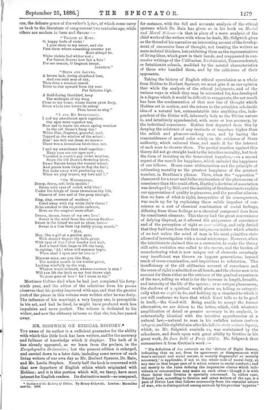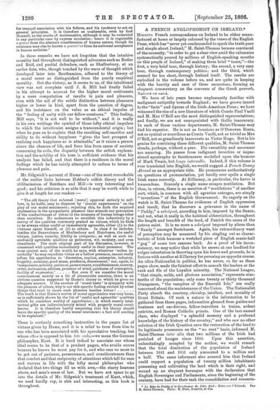MR. SIDGWICK ON ETHICAL HISTORY.*
THE name of its author is a sufficient guarantee for the ability with which this little book has been written, and for the accuracy and fullness of knowledge which it displays. The bulk of it has already appeared, as we learn from the preface, in the Encyclopcedia Britannica ; but the present edition is enlarged, and carried down to a later date, including some review of such living writers of our own day as Mr. Herbert Spencer, Dr. Bain, and Mr. Leslie Stephen. Nearly half the book is concerned with that new departure of English ethics which originated with Hobbes ; and it is this portion which will, we fancy, have most interest for English readers. Its distinctive merit—as compared, • Outlines of the Hittory of Ethics. By Henry Eidgwick. London; Macmillan and C. 1888. for instance, with the full and accurate analysis of the ethical systems which Dr. Bain has given us in his book on Mental and Moral Science—is that in place of a mere analysis of the
chief works of the writers with whom he deals, Mr. Sidgwick gives as the thread of his narrative an interesting acount of the develop- ment of successive lines of thought, not treating the writers as mere isolated thinkers, but exhibiting them as the representatives of living ideas, which grew in their hands, and reappeared in suc- cessive writings of the Utilitarian, Evolutionist, Transcendental, or Intuitionist schools, modified by the mental characteristics of those who handled them, and by the criticisms of their opponents.
Taking the history of English ethical speculation as a whole from Hobbes to Herbert Spencer, we must give it as our opinion that while the analysis of the ethical judgments, and of the various ways in which they may be accounted for, has developed in a degree which it would be difficult to exaggerate, the net result has been the condemnation of that new line of thought which Hobbes set in motion, and the return to the primitive scholastic idea of a natural law, untranslatable into anything else, inde- pendent of the Divine will, inherently holy as the Divine nature is, and intuitively apprehended, with more or less accuracy, by the individual conscience. Hobbes first departed from this by denying the existence of any instincts or impulses higher than the selfish and pleasure-seeking ones, and by basing the reasonableness of moral rules solely on the existence of State authority, which enforced them, and made it for the interest of each man to observe them. The partial reaction against this theory did not go straight back to the intuitive morality, but took the form of insisting on the benevolent impulses,— on a second aspect of the search for happiness, which included the happiness of our fellows. Hence came utilitarianism and the principle of estimating morality as the greatest happiness of the greatest number, in Bentham's phrase. Then, when the " opposition " clamoured. for a truer and fuller explanation of the phenomena of conscience than this could effect, Hartley's doctrine of association was developed by Mill; and the inability of Benthamism to explain our appreciation of quality in pleasures, and the peculiar admira- tion we have of what is right, irrespective of its consequences, was male up for by explaining these subtle impulses of con- science as a sort of chemical combination of social feelings, differing from those feelings as a chemical compound does from its constituent elements. This theory had the great convenience
of defying disproof, as it allowed the uniqueness of conscience and of the perception of right as nolo existing, and only denied that they had been from the first unique,—a matter which admits
of no test unless the mind of man in his most primitive state allowed of investigation with a moral microscope. However, when the intuitionists claimed this as a surrender, to make the theory still safer, evolution was called to the rescue, and the burden of manufacturing what is now unique out of elements seemingly very insufficient was thrown on bygone generations, beyond reach of cross-examination, and impervious to refutation. The insufficiency of the old utilitarian account of conscience and the sense of right is admitted on all hands, and the choice now is to account for them either as the outcome of the gradual experience of the race, telling us what is for the increase in length, breadth,
and intensity of the life of the species ; or as unique phenomena, the shadows of a spiritual world above us, telling us categori- cally what we ought to do, and holding up a standard to which if
our will conforms we have that which Kant tells us to be good in itself,—the Good-will. Being unable to accept the former
alternative, we are driven to the latter, which, with whatever amplification of detail or greater accuracy in its analysis, is substantially identical with the intuitive apprehension of a natural law,—natural to man in his unfallen nature (natures integra),and his rightful aim after his fall an statu 211IgUTCC lap8a9 which, as Mr. Sidgwick reminds us, was maintained by the schoolmen, and dwelt upon with great ability by Grotius in his great work, De Jure Belli et Paris (1625). Mr. Sidgwick thus summarises it from Grotius's work :— "His definition of Jus nature/a as the dictate of Right Reason, indicating that an act, from its agreement or disagreement with man's rational and social nature, is morally disgraceful or morally necessary,' is applicable, if not to the whole code of moral duty, at any rate to that larger part of it which relates to social conduct ; and not merely to the rules defining the imperative claims which indi- viduals or communities may make on each other—though it is with these latter that Grotius is specially concerned. In either case, Natural Law, according to Grotius sad other writers of the age, is a part of Divine Law that follows necessarily from the essential nature of man, who is distinguished among animals by his peculiar 'appetite' for tranquil association with his fellows, and his tendency to act on general principles. It is therefore as unalterable, even by God Himself, as the truths of mathematics, although it may be overruled in any particular case by express revelation ; hence it is cognisable a priori from the abstract consideration of human nature, though its existence may also be known a posterilri from its universal acceptance in human societies."
In these remarks we have not forgotten that the intuitive morality had throughout distinguished advocates such as Butler and Reid, and partial defenders, such as Shaftesbury, at an earlier date, who, though touched by the wave of thought which developed later into Benthamism, adhered to the theory of a moral sense as distinguished from the purely empirical morality. But the victory, as it seems to us, of the intuitional view was not complete until J. S. Mill had finally failed in his attempt to account for the higher moral sentiments by a mere computation of results in pain and pleasure, even with the aid of the subtle distinction between pleasures higher or lower in kind, apart from the question of degree, and his insistance on the value as an ethical impulse of the "feeling of unity with our fellow-creatures." This feeling, Mill says, "it is not well to be without," and it is really in his own writings the symbol of those lofty ethical impulses to which the intuitionist assigns a transcendental origin ; but when he goes on to explain that the resulting self-sacrifice and ability to do without happiness "gives the best prospect of realising such happiness as is attainable," as it raises a person above the chances of life, and frees him from cause of anxiety concerning its evils, the disparity between the selfish explana- tion and the nobility of his tone is sufficient evidence that his analysis has failed, and that there is a residuum in the moral feelings which he has vainly attempted to reduce to terms of pleasure and pain.
Mr. Sidgwick's account of Hume—one of the most remarkable of the earlier links between Hobbes's selfish theory and the utilitarianism of Bentham and Mill—is very interesting and good ; and his criticism is so able that it may be worth while to give it at length for our readers :—
"The old theory that referred [moral] approval entirely to self- love, is, be holds, easy to disprove by 'crucial experiments' on the play of our moral sentiments ; rejecting this, he finds the required explanation in the sympathetic pleasure that attends our perception of the conduciveness of virtue to the interests of human beings other than ourselves. He endeavours to establish this inductively by a survey of the qualities commonly praised as virtues, which he finds to be always either useful or immediately agreeable, either (1) to the virtuous agent himself, or (2) to others. In class 2 he includes, besides the Benevolence of Shaftesbury and Hutcheson, the useful virtues, justice, veracity, fidelity to compacts ; as well as such im- mediately agreeable qualities as politeness, wit, modesty, and even cleanliness. The most original part of his discussion, however, is concerned with qualities immediately useful to their possessor. The most cynical man of the world, he says, with whatever sullen in- credulity' he may repudiate virtue as a hollow pretence, cannot really refuse his approbation to discretion, caution, enterprise, industry, frugality, economy, good sense, prudence, discernment,' nor, again, to temperance, sobriety, patience, perseverance, considerateness, secrecy, order, insinuation, address, presence of mind, quickness of conception,
facility of expression.' But even if we consider the moral consciousness merely as a bit of pleasurable emotion, there is an obvious question suggested by Hume's theory to which be gives no adequate answer. If the essence of moral taste ' is sympathy with the pleasure of others, why is not this specific feeling excited by other things that tend to cause such pleasure besides virtue ? The truth is that Hutne's notion of moral approbation was very loose, as is sufficiently shown by the list of useful and agreeable' qualities which he considers worthy of approbation ; in which merely intel- tectual gifts are indiscriminately mixed with properly moral excel- lences. It is therefore hardly surprising that his theory should leave the specific quality of the moral sentiments a fact still needing to be explained."
There is certianly something instructive in the pagan list of virtues given by Hume, and it is a relief to turn from him to one who has been associated with his speculative teaching, but whose ethos is opposed to him toto coelo,—we mean the German
philosopher, Kant. It is hard indeed to associate one whose ideal seems to be that of a prudent pagan, who avoids excess because he knows he must pay for it, and who sees no more to be got out of patience, perseverance, and considerateness than that comfort and that reciprocity of attentions which tell for ease and success in life with the lofty moral philosopher who declared that two things fill us with awe,—the starry heavens above, and man's sense of law. But we have not space to go into the details of Mr. Sidgwick's treatment of Kant, which, we need, hardly say, is able and interesting, as this book is throughout.



































 Previous page
Previous page